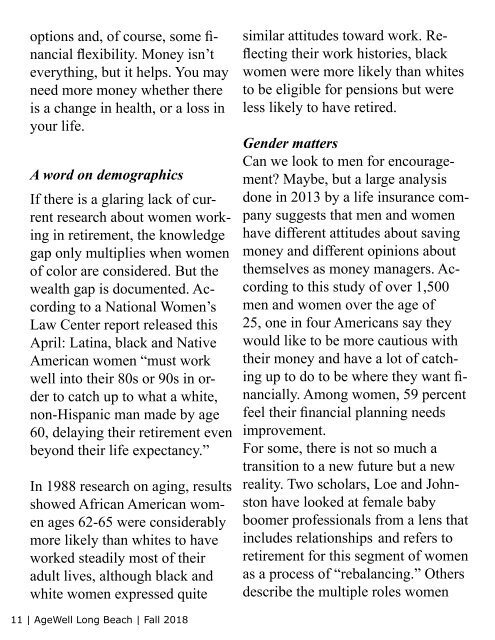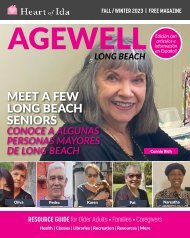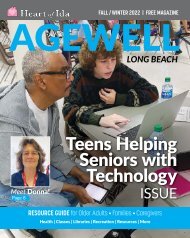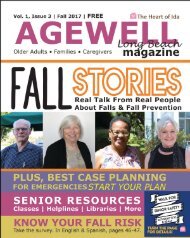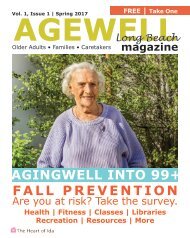Fall 2018
You also want an ePaper? Increase the reach of your titles
YUMPU automatically turns print PDFs into web optimized ePapers that Google loves.
options and, of course, some financial<br />
flexibility. Money isn’t<br />
everything, but it helps. You may<br />
need more money whether there<br />
is a change in health, or a loss in<br />
your life.<br />
A word on demographics<br />
If there is a glaring lack of current<br />
research about women working<br />
in retirement, the knowledge<br />
gap only multiplies when women<br />
of color are considered. But the<br />
wealth gap is documented. According<br />
to a National Women’s<br />
Law Center report released this<br />
April: Latina, black and Native<br />
American women “must work<br />
well into their 80s or 90s in order<br />
to catch up to what a white,<br />
non-Hispanic man made by age<br />
60, delaying their retirement even<br />
beyond their life expectancy.”<br />
In 1988 research on aging, results<br />
showed African American women<br />
ages 62-65 were considerably<br />
more likely than whites to have<br />
worked steadily most of their<br />
adult lives, although black and<br />
white women expressed quite<br />
similar attitudes toward work. Reflecting<br />
their work histories, black<br />
women were more likely than whites<br />
to be eligible for pensions but were<br />
less likely to have retired.<br />
Gender matters<br />
Can we look to men for encouragement?<br />
Maybe, but a large analysis<br />
done in 2013 by a life insurance company<br />
suggests that men and women<br />
have different attitudes about saving<br />
money and different opinions about<br />
themselves as money managers. According<br />
to this study of over 1,500<br />
men and women over the age of<br />
25, one in four Americans say they<br />
would like to be more cautious with<br />
their money and have a lot of catching<br />
up to do to be where they want financially.<br />
Among women, 59 percent<br />
feel their financial planning needs<br />
improvement.<br />
For some, there is not so much a<br />
transition to a new future but a new<br />
reality. Two scholars, Loe and Johnston<br />
have looked at female baby<br />
boomer professionals from a lens that<br />
includes relationships and refers to<br />
retirement for this segment of women<br />
as a process of “rebalancing.” Others<br />
describe the multiple roles women<br />
have during their adult life and<br />
how these get reshaped in later<br />
years. The idea of rebalancing<br />
intuitively makes sense.<br />
For me, Ruth Karpen, hits the<br />
nail on the head. In her 2017<br />
article, “Reflections on Women’s<br />
Retirement,” she lays out<br />
how boomers may change the<br />
idea, or rather bust the myth of<br />
retirement. She is clear that the<br />
designation of boomer may apply<br />
only to white, well-educated<br />
women – and that there is a<br />
world of diversity that has many<br />
implications. The larger lesson<br />
may be that retirement is personal,<br />
it is about relationships<br />
that make up a very largepart of<br />
our life.<br />
My experience is sharply different<br />
from my mother in financial<br />
status and attitude. As a boomer,<br />
I worked my entire adult life.<br />
No breaks for kids. Went out on<br />
my own without a salaried job.<br />
Moved to another part of the<br />
country, married, divorced, mar<br />
ried.<br />
I’ve had to anticipate financial<br />
stability while running a small<br />
company - no real chance<br />
chance to save, Yet, looking at others<br />
like me, those born about the same<br />
time, with similar education and racial<br />
background, remains a good<br />
mirror. But I also look to women of<br />
color, recent immigrants, and those<br />
with different educational and cultural<br />
backgrounds, for some timely<br />
solutions. And maybe that is what we<br />
should do as the book is rewritten for<br />
our generation. Look at others, like<br />
yourself. And, look at others. A new<br />
and improved sisterhood.<br />
The possibilities<br />
But what to do? We all need to<br />
change as we age. Start figuring out<br />
your reality. Work with your resources<br />
and peer group.<br />
Maybe it’s your book club or a group<br />
at church. Your local library and<br />
community center offer ways to intersect<br />
with women from different backgrounds<br />
with common concerns.<br />
Asking questions, you’ll realize that<br />
the nursing career you left a few decades<br />
ago might be a lead-in to working<br />
part time at a senior wellness<br />
clinic. Or perhaps your management<br />
skill set using industry-grade technology<br />
might allow you to work a short<br />
shift at an inductrial site. Or you might<br />
11 | AgeWell Long Beach | <strong>Fall</strong> <strong>2018</strong> AgeWell Long Beach | <strong>Fall</strong> <strong>2018</strong> | 12


